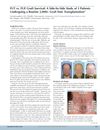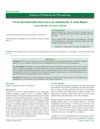 28 citations,
September 1998 in “Medical Clinics of North America”
28 citations,
September 1998 in “Medical Clinics of North America” Most hair loss can be diagnosed with patient history and physical exam, and a few common types make up most cases.
26 citations,
July 2012 in “Journal of family planning and reproductive health care” The document says that hirsutism in women usually needs hair removal and hormone treatment to manage symptoms and improve well-being.
 4 citations,
December 2012 in “Medical Hypotheses”
4 citations,
December 2012 in “Medical Hypotheses” Prediabetes may be a risk factor for hair loss.
 3 citations,
July 2021 in “Aesthetic Plastic Surgery”
3 citations,
July 2021 in “Aesthetic Plastic Surgery” PHAT may improve hair growth better than PRP alone.
 13 citations,
September 2018 in “Hair transplant forum international”
13 citations,
September 2018 in “Hair transplant forum international” FUE and FUT hair transplants have similar success rates, with FUE slightly better.
 12 citations,
January 1978 in “The Laryngoscope”
12 citations,
January 1978 in “The Laryngoscope” Using a scalp flap for hair transplantation gives denser, faster results than older methods, but it's complex and needs careful planning.
 3 citations,
November 2008 in “Facial Plastic Surgery”
3 citations,
November 2008 in “Facial Plastic Surgery” Adding hair restoration to a cosmetic surgery practice requires a skilled team and specialized equipment.
 2 citations,
January 2013 in “Hair therapy & transplantation”
2 citations,
January 2013 in “Hair therapy & transplantation” Hair loss may signal metabolic problems and increased risk of heart disease, suggesting people with hair loss should be checked for these issues.
 1 citations,
September 2003 in “Journal of the Royal Society of Medicine”
1 citations,
September 2003 in “Journal of the Royal Society of Medicine” The book is a detailed guide on hair and scalp diseases, useful for dermatopathologists.
 69 citations,
August 2014 in “Journal of The American Academy of Dermatology”
69 citations,
August 2014 in “Journal of The American Academy of Dermatology” Trichoscopy is a quick, cost-effective tool for diagnosing different hair loss conditions.
 40 citations,
July 2017 in “Frontiers in Medicine”
40 citations,
July 2017 in “Frontiers in Medicine” Early and personalized treatment for hair loss in young people is crucial to prevent permanent damage and should include psychological support.
 21 citations,
May 1996 in “Current problems in dermatology”
21 citations,
May 1996 in “Current problems in dermatology” Detailed patient history and physical exams are crucial for diagnosing hair loss.
 13 citations,
September 2002 in “Dermatologic Surgery”
13 citations,
September 2002 in “Dermatologic Surgery” Effective repair of bad hair transplants requires skilled techniques and careful use of donor hair, with strategies like reimplantation and camouflage, and new methods to minimize scarring.
 10 citations,
December 2019 in “International journal of medicinal chemistry”
10 citations,
December 2019 in “International journal of medicinal chemistry” Chemicals from the plant Dicerocaryum senecioides were found to safely speed up and increase hair growth in mice.
 1 citations,
May 2019 in “British journal of health care management/British journal of healthcare management”
1 citations,
May 2019 in “British journal of health care management/British journal of healthcare management” Choose cost-effective emollients for dry skin conditions and prescribe appropriate amounts.
 June 2020 in “Journal of Investigative Dermatology”
June 2020 in “Journal of Investigative Dermatology” Red clover extract-based scalp treatments significantly improved hair volume and reduced hair loss and damage.
 December 2019 in “Journal of pediatrics & neonatology”
December 2019 in “Journal of pediatrics & neonatology” A 13-year-old boy had a rare, stable type of hair loss with little chance of regrowth, but treatment is available for looks.

Eating flaxseed made rabbit hair longer and thicker and improved their weight and blood sugar and cholesterol levels.
 February 2008 in “Basic and clinical dermatology”
February 2008 in “Basic and clinical dermatology” Photographic imaging is crucial for documenting and managing hair loss, requiring careful preparation and standardization to be effective.
 October 2002 in “Dermatologic Surgery”
October 2002 in “Dermatologic Surgery” The document concludes that careful planning, efficient use of every hair graft, and setting surgical priorities are crucial for successful hair restoration surgery.
 September 2002 in “Dermatologic Surgery”
September 2002 in “Dermatologic Surgery” The best results in surgical hair restoration come from careful techniques, optimal use of limited hair supply, correct hair direction, saving hair for key areas, understanding scarring effects, and adjusting hair graft density.
 173 citations,
January 2014 in “Nature Cell Biology”
173 citations,
January 2014 in “Nature Cell Biology” Wnt signaling controls whether hair follicle stem cells stay inactive or regenerate hair.
 147 citations,
January 2014 in “American Journal of Clinical Dermatology”
147 citations,
January 2014 in “American Journal of Clinical Dermatology” Laser device increases hair density, safe for treating hair loss in men and women.
 136 citations,
May 2019 in “Cells”
136 citations,
May 2019 in “Cells” Stem cell therapy, particularly using certain types of cells, shows promise for treating hair loss by stimulating hair growth and development, but more extensive trials are needed to confirm these findings.
 87 citations,
October 1997 in “JAMA”
87 citations,
October 1997 in “JAMA” Some vaccines might rarely cause hair loss, more research is needed.
 72 citations,
February 2011 in “American Journal of Biological Anthropology”
72 citations,
February 2011 in “American Journal of Biological Anthropology” The conclusion is that recognizing hair growth cycles can improve the precision of dietary and health assessments from hair analysis.
 72 citations,
October 2010 in “Journal of The American Academy of Dermatology”
72 citations,
October 2010 in “Journal of The American Academy of Dermatology” Iron deficiency common in women, not always linked to hair loss; more research needed.
 69 citations,
April 2019 in “Biomedicines”
69 citations,
April 2019 in “Biomedicines” PRP and HF-MSCs treatment improves hair growth, thickness, and density in androgenetic alopecia.
 56 citations,
May 2017 in “Nature Cell Biology”
56 citations,
May 2017 in “Nature Cell Biology” Hair can regrow after certain stem cells are lost because other stem cells can take over their role.
 45 citations,
March 2015 in “Clinical Endocrinology”
45 citations,
March 2015 in “Clinical Endocrinology” Testosterone therapy is generally safe for transmen, improves sexual function, and has manageable health risks with proper monitoring.





























